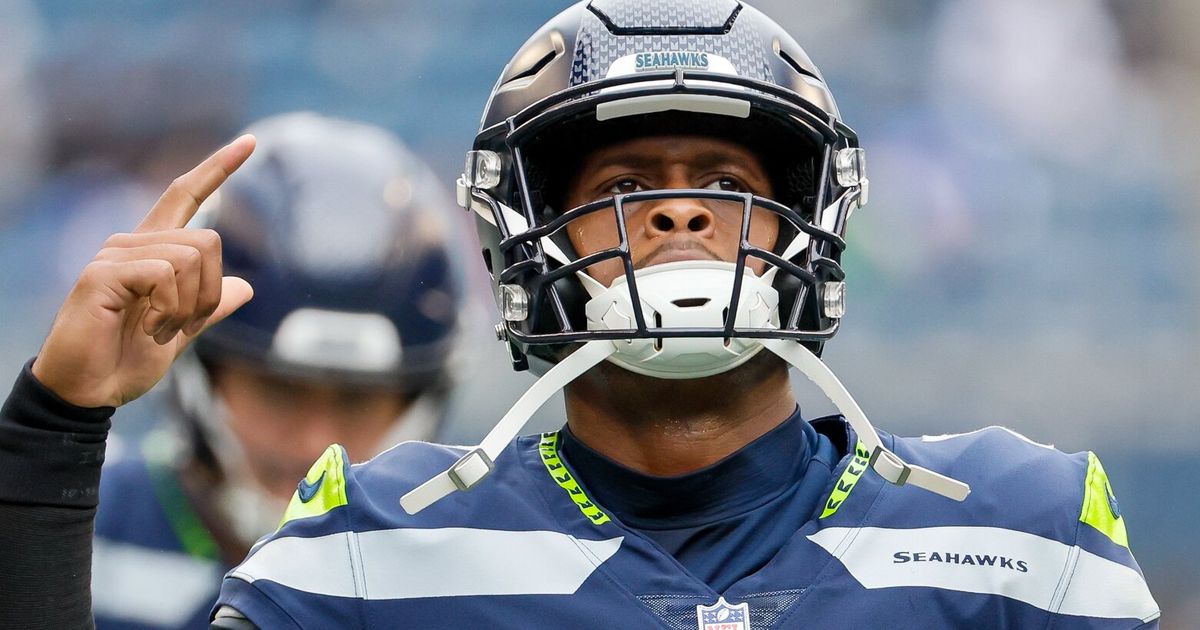
The number seems high if not downright ridiculous. Seven-year-backup-turned-one-year-starter Geno Smith has been estimated by some to be worth at least $35 million per year — with sportrac.com listing his market value at over $39 million annually, a figure Yahoo! thinks is about right.
This is based on one pretty good season with the Seahawks in which the 32-year-old served up a majestic first half and a middling second half en route to a 9-8 record and first-round playoff exit. It’s a unique situation for the Seahawks’ front office, which is tasked with making a major financial decision based on an 18-game sample size.
So what’s the play? Last week, I argued that Smith hadn’t proved enough to warrant a monster deal with the Seahawks — that he faded in November and December like a middle-distance runner who came out too hot on the first lap.
I made the point that oftentimes the Super Bowl-winning formula is to build around a QB on a rookie deal the way the Seahawks did with Russell Wilson and the Chiefs did with Patrick Mahomes. There is an issue with this, though: most young quarterbacks suck.
Take a look at the first four signal callers in the 2018 draft: You had Baker Mayfield (first overall), Sam Darnold (third), Josh Allen (seventh) and Josh Rosen (10th). Just one of those — Allen — has developed anything resembling a quality career.
The next year you had Kyler Murray (first), Daniel Jones (sixth) and Dwayne Haskins (15th) as the first three QBs selected. Though Murray and Jones solidified themselves as starters, none have proved to be championship-caliber.
We remember the Lamar Jacksons, Joe Burrows and Trevor Lawrences over the past few years. But for every one of those there is a Mitch Trubisky or Zach Wilson — or, dare I say, Jameis Winston or Marcus Mariota, neither of whom became reliable enough to spawn lucrative extensions.
So here are the Seahawks with the No. 5 overall pick, and three QBs (Bryce Young, Will Levis and C.J. Stroud) projected to go in the top five by most mock drafts.
It’s a legitimate dilemma. If the Seahawks want to maximize their chances of being a playoff team for the next few years, the move is to lock up Geno, who will likely produce solid numbers if he stays healthy. He isn’t going to command top-of-the-market money, so there will still be some room to add pieces. But inking Smith to a long-term deal will swallow much of the cap room that teams such as Cincinnati or Philadelphia have used recently to build monster rosters around QBs playing on first-year deals.
So if they want to maximize their chances of winning a championship? Well, then the move is probably gambling on a youngster such as Stroud if they can nab him.
That’s a huge if, by the way. This process might be a whole lot easier if the Seahawks were picking third and knew they could snag one of the three aforementioned signal callers. They don’t. The Broncos — who traded away their pick to Seattle — just had to win that final game of the season, didn’t they?
One thing to note is that this is the NFL, not the NBA. In the latter league, the best team (if healthy) almost always wins. When there are hundreds of possessions per game, and each series is a best of seven, it’s rare that the weaker squad advances. But if you look at some of those Eli Manning-led Giants teams that won Lombardi Trophies, it’s clear you can break through as a lower seed in a single-game elimination format. This could affect the Seahawks’ thinking, knowing that simply making the postseason could lead to grand achievements with a few breaks.
You don’t want to be the team hoping for breaks, though. You want to be the team that breaks spirits — as the 2013 Seahawks did all season. Do you get that with Geno?
I don’t know. Smith is the safe bet, but he’s far from the sure one. A rookie quarterback could spark years of prosperity, or he could flame out.
The Seahawks have world-class draft capital and a veteran quarterback who wants to re-up with them. Seems like an embarrassment of riches. Unfortunately, it could also lead to an embarrassingly bad decision.